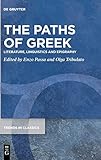The Paths of Greek : Literature, Linguistics and Epigraphy / ed. by Enzo Passa, Olga Tribulato.
Material type: TextSeries: Trends in Classics - Supplementary Volumes ; 85Publisher: Berlin ; Boston : De Gruyter, [2019]Copyright date: ©2019Description: 1 online resource (XX, 283 p.)Content type:
TextSeries: Trends in Classics - Supplementary Volumes ; 85Publisher: Berlin ; Boston : De Gruyter, [2019]Copyright date: ©2019Description: 1 online resource (XX, 283 p.)Content type: - 9783110621082
- 9783110621808
- 9783110621747
- online - DeGruyter
- Issued also in print.
| Item type | Current library | Call number | URL | Status | Notes | Barcode | |
|---|---|---|---|---|---|---|---|
 eBook
eBook
|
Biblioteca "Angelicum" Pont. Univ. S.Tommaso d'Aquino Nuvola online | online - DeGruyter (Browse shelf(Opens below)) | Online access | Not for loan (Accesso limitato) | Accesso per gli utenti autorizzati / Access for authorized users | (dgr)9783110621747 |
Frontmatter -- Contents -- Acknowledgments -- General Abbreviations -- Signs and Symbols -- Bibliographical Abbreviations -- Introduction -- Bibliography of Albio Cesare Cassio -- Unconventional Features in Homer: The Case of ἑέ and ἑοῖ -- σθένεϊ βλεμεαίνων: Origin and Evolution of a Homeric Formula -- Active versus Middle Perfect in Homeric Greek: Synchrony and Diachrony -- Empedocles in the West, Panyassis in the East: Doric and Hexameter Poetry in the Classical Age -- Of Land, Ancestral Property and Prophecy in Corinna PMG 654 col. iii ll. 37–39 -- Epicharmus and Choral Lyric Poetry: A Reappraisal of Old and New Evidence -- Early Dactylic Prose in the History of Greek Prose Rhythm -- Gk. ταπεινός ‘Low(-lying)’ and Its IE Heritage: Gk. PN Τέμπυρα, Hitt. dampu- ‘Blunt’, Old Russ. tupъ ‘Blunt, Stupid’ -- Prose and Poetry of Pain: A History of the Term ἄλγος -- Making the Case for a Linguistic Investigation of Greek Lexicography: Some Examples from the Byzantine Reception of Atticist Lemmas -- List of Contributors -- Index of Notable Words -- Index of Subjects -- Index of Passages
restricted access online access with authorization star
http://purl.org/coar/access_right/c_16ec
This volume proposes a multidisciplinary approach to the history of Ancient Greek. Each of its ten papers offers a methodological example of how the study of Greek can be greatly enhanced by a truly multidisciplinary perspective in which the analysis of language interacts with epigraphy, textual philology and comparative linguistics, yet without neglecting the role that linguistic features play in the texts in which they are used, and hence in the culture which produced both. The first four papers tackle epic language, addressing eccentric pronouns and formulas, the role and semantics of the middle perfect, and the development of hexameter poetry in the colonial West. The next two papers are devoted to lyric poetry and its linguistic influence in Greek literature and tackle fragments by Corinna and Epicharmus respectively. The remaining four contributions look into a variety of topics spanning from early Ionic prose to the diachronic development of the Greek lexicon and its reception in Byzantine lexicography. They all provide examples of how Greek literary language evolved across the centuries, how it was perceived by ancient scholars, and what contribution modern linguistic approaches can provide to our understanding of both these issues.
Issued also in print.
Mode of access: Internet via World Wide Web.
In English.
Description based on online resource; title from PDF title page (publisher's Web site, viewed 28. Feb 2023)


